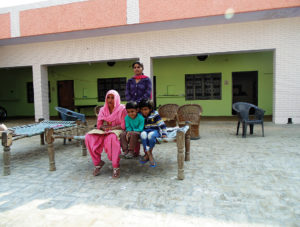Village women who have headed panchayats as Pradhans have not quite been able to break patriarchal barriers but their brush with power has boosted their self-confidence
“Ghar ki pradhan banna kaphi hai” (Being the leader of the house is enough) was one lady’s reply to a question I had asked several of them: Would you like be the next Pradhan of your village?
The rest laughed, giggled, one gave a faint smile with a curt ‘No’. Why is that this village in Uttar Pradesh’s Meerut which has witnessed three women leaders as the head of the panchayat for five terms refuse to even consider something that has become a common sight for the past 25 years now?

The answers are vague.
The Pradhan of Bharoli village, Komal, said she would not go for re-election because next time her father-in-law may contest. The strange thing is, more than a few times Dayachand, the father-in-law of Komal, was referred to as the Pradhan by people around. He lost in the elections before his daughter-in-law won, and has now perhaps established his status via her.
When we decided to go around the village and meet people, Komal did not join us. Instead she swiftly went back into her room just as our backs were turned and we were left with Dayachand and his son.
People outside their homes, sitting on their charpoys were all men or young boys. When a lady finally emerged, she quickly ran into one of the rooms of the house. A host of women followed and I was asked to go in if I wanted to speak to the women.
They laughed when I asked them how they felt as women, having a woman as the leader of their village. But when asked about Komal’s performance, one said she was very nice, the other said she had done a lot of hard work, built proper roads, and another said she should win again next time.
Within the confines of the room, these women were confident, and funny. Why they couldn’t or wouldn’t be as open in front of their own village people (men) can only be explained as old patriarchal norms still highly prevalent here.
Raveeta, one of the women in the group, was more vocal and positive about where women stood in the village. She said everyone treated each other equally and that if there was any difference, women should keep coming forward to work. “Woh police officer bun rahain hain. Ladkiya aur ladko main kuch antar nahi hain” (Girls are even becoming police officers. There’s no difference between boys and girls”.
But Meerut still has a long way to go. The sex ratio of 886 females for every 1000 males, is lower than the state (UP) average of 908; while the child sex ratio is 852, lower than the state average of 899.
Komal herself, has a young boy and girl who she says will study till college and beyond, “jabtak woh padhna chahe” (till they wish to study).
But what serious change of thought has occurred is difficult to say as Komal’s sister-in-law, who passed her 12th grade, waits to find a boy to get married to. Deciding not to study anymore as that is what happens in a village, in her words.
Their traditions are so entrenched that the old is trying to fight the new, brought on by the government’s policies.
While I didn’t know what to expect going for a story to find women panchayat leaders, a few minutes into our meeting, my doubts were emerging. The aim was to see if this leader had some serious power or was a proxy for the male members in her family. This had to be done without being judgemental and only decipher what I saw.
So, first I went to meet Komal in her home. She didn’t greet us at her porch, finally emerging in her dupatta covered face as the clear alpha male of the house – her father-in-law – briefed us about the village, the development and the problems they were facing.
On the other hand, Komal was timid about it all. It seemed weird that someone with power would so apparently display none, and respond in two words when asked about the work she has carried out since becoming the Pradhan in 2015.
“Kuchh sign karna hota hain toh main karti hoon” (If there’s something to sign I do that) she said about her day-to-day work life and that people could come in and out whenever to seek help. 





